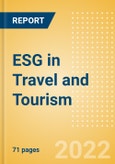This thematic research report takes an in-depth look at ESG in travel and tourism. Firstly, the players section identifies some of the leading and challenging companies in this theme and categorizes their position in the value chain. A theme briefing follows the players section, which dissects the publisher's ESG framework, and offers industry examples of how travel and tourism companies from a range of different sectors are addressing specific ESG factors. A trends section is then provided, describing technology, macroeconomic, regulatory, and industry trends connected to the ESG in travel and tourism theme. An industry analysis follows, providing insight into consumer sentiment around aspects of ESG, and a deep dive into company filing and hiring trends. Mergers and acquisitions, and a timeline are then provided, which showcases the emerging importance of ESG in travel and tourism. Penultimately, the ESG in travel and tourism value chain is reviewed, with each segment of the chain being given an in-depth description. Finally, the leading and challenging companies in the theme are outlined, along with their competitive position in the industry, and scorecards are provided to show how each major company in their respective sector is scored for this theme.
Due to the amount of information consumers now have at their fingertips, and past greenwashing scandals that have gained worldwide media attention, travelers are much more aware of potential greenwashing attempts, and accuse companies of lying if they are suspicious. If a travel and tourism company is found guilty of greenwashing, it could create irreparable damage for its image.
Key Highlights
- Travelers now want more meaningful experiences, as seen with the emerging tourism trend of slow travel. Slow travel mainly refers to the speed of which a trip is taken, where travelers take a train through Europe instead of flying, for example. However, it also has a broader meaning of tourists staying in destinations for longer, emphasizing a connection with local people, culture, food, and music. This means that slow travel is also more sustainable for local communities and the environment. Remote workers and digital nomads have been key contributors to this trend, as they can stay in one, or multiple, locations for a sustained period of time. According to a the publisher poll (ended January 12, 2022, with 1,064 responses), (xx) of respondents stated that their preferred length of stay for a leisure trip was more ‘than 10 nights’, which was the second highest percentage after ‘4-6 nights’. This suggests that slow travel will continue to emerge as a major tourism trend as the pandemic curtails
- While the sharing economy can boost environmental and social performance in relation to ESG, governance has often been an issue due to the nature of this model. The safety of this model is often called in to question, and how it is regulated. Many sharing economy companies in tourism operate within areas where regulation is lacking or unclear, due to existing laws still catching up with how these businesses work. Aside from legal issues and labor disputes, there are concerns that companies in the sharing economy are not doing enough to ensure the safety of their customers and hosts. A significant part of the sharing economy is built on trust between the customer and the host. Unfortunately, people from both sides will often abuse this trust
Scope
- This report provides an overview of ESG in travel and tourism
- This report explains why ESG in travel and tourism will continue to grow in importance
- This report outlines how the need for high levels of ESG performance from stakeholders is met by companies
- This report provides examples of what companies and organizations in the travel and tourism industry are doing in reaction to this theme, and how they create differentiation
- We highlight travel and tourism companies that are leading in this theme, such as Melia, Accor, Hurtigruten, Wizz Air, Walt Disney, Royal Schiphol Group, Deutsche Bahn, Expedia Group, and Carnival Corporation
Reasons to Buy
- To understand ESG in travel and tourism, and its current and future impact on the industry
- To assess the strategies that leading companies are adopting to attract responsible travelers
- To identify the leading and challenging companies in this theme
- To understand how this theme is being shaped by a range of different technology, macroeconomic, regulatory, and industry trends
- The publisher's thematic research ecosystem is a single, integrated global research platform that provides an easy-to-use framework for tracking all themes across all companies in all sectors. It has a proven track record of identifying the important themes early, enabling companies to make the right investments ahead of the competition, and secure that all-important competitive advantage
Table of Contents
Executive Summary- Players
- Theme Briefing
- ESG Framework in Travel and Tourism
- Trends
- Industry Analysis
- Value Chain
- Companies
- Sector Scorecards
- Glossary
- Further Reading
- Our Thematic Research Methodology
- About the Publisher
- Contact the Publisher
Companies Mentioned (Partial List)
A selection of companies mentioned in this report includes, but is not limited to:
- Melia
- Accor
- Hurtigruten
- Wizz Air
- Walt Disney
- Royal Schiphol Group
- Deutsche Bahn
- Expedia Group
- and Carnival Corporation
- Ponant
- Marriott International
- Hilton Hotels and Resorts
- Comcast
- VINCI
- InterContinental Hotels and Resorts








